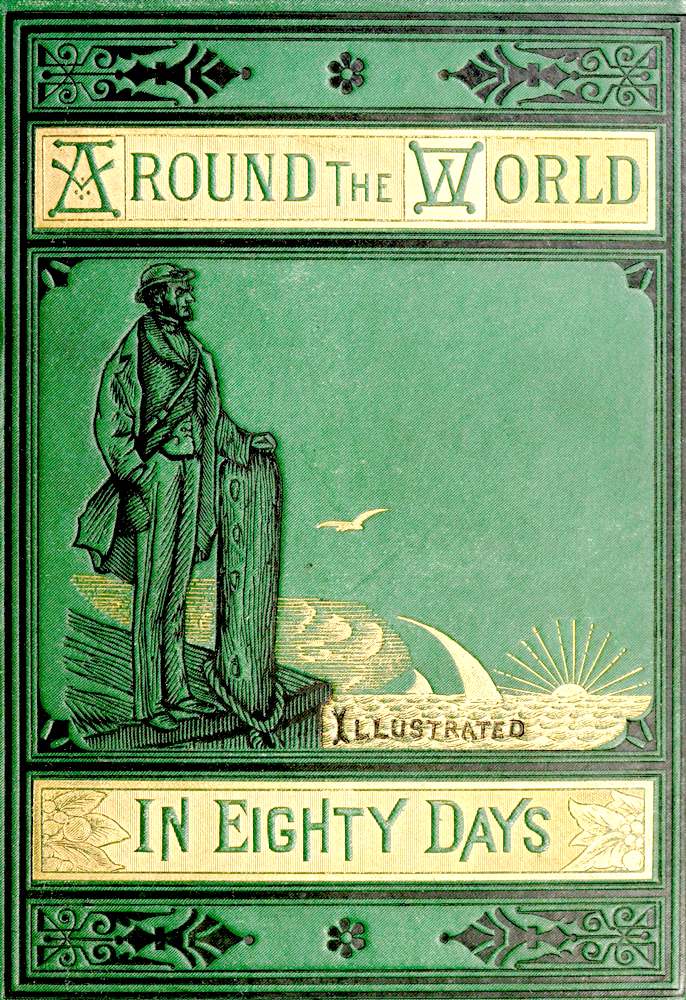|
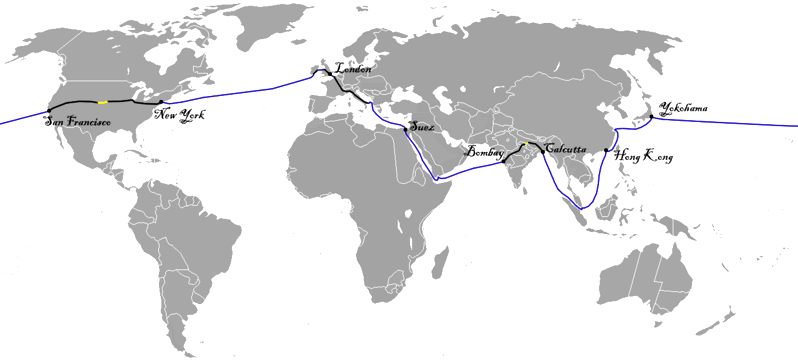
Map
of the route taken by Phileas Fogg, starting in London, then proceeding
east to Suez, Bombay, Calcutta, Hong Kong , Yokohama, San Francisco, New
York, and across the Atlantic
ocean to Ireland, then Liverpool England, and back to London. The route
planner below is for a circumnavigation on water in under 80 days, using
hydrogen, as per the author's prediction in The Mysterious Island. It
would be a major achievement if this was arranged to honor the 150th
anniversary of his publication.
<<<<
- CHAPTER
XVI.
IN WHICH FIX DOES NOT SEEM TO UNDERSTAND IN THE LEAST WHAT IS SAID TO HIM
The “Rangoon”—one of the Peninsular and Oriental Company’s boats plying in the
Chinese and
Japanese
seas—was a screw steamer, built of iron, weighing about seventeen hundred and seventy tons, and with engines of four hundred horse-power. She was as fast, but not as well fitted up, as the “Mongolia,” and Aouda was not as comfortably provided for on board of her as Phileas Fogg could have wished. However, the trip from Calcutta to Hong Kong only comprised some three thousand five hundred miles, occupying from ten to twelve days, and the young woman was not difficult to please.
During the first days of the journey Aouda became better acquainted with her protector, and constantly gave evidence of her deep gratitude for what he had done. The phlegmatic gentleman listened to her, apparently at least, with coldness, neither his voice nor his manner betraying the slightest emotion; but he seemed to be always on the watch that nothing should be wanting to Aouda’s comfort. He visited her regularly each day at certain hours, not so much to talk himself, as to sit and hear her talk. He treated her with the strictest politeness, but with the precision of an automaton, the movements of which had been arranged for this purpose. Aouda did not quite know what to make of him, though Passepartout had given her some hints of his master’s eccentricity, and made her smile by telling her of the wager which was sending him round the world. After all, she owed Phileas Fogg her life, and she always regarded him through the exalting medium of her gratitude.
Aouda confirmed the Parsee guide’s narrative of her touching history. She did, indeed, belong to the highest of the native races of India. Many of the Parsee merchants have made great fortunes there by dealing in cotton; and one of them, Sir Jametsee Jeejeebhoy, was made a baronet by the English government. Aouda was a relative of this great man, and it was his cousin, Jeejeeh, whom she hoped to join at Hong Kong. Whether she would find a protector in him she could not tell; but Mr. Fogg essayed to calm her anxieties, and to assure her that everything would be mathematically—he used the very word—arranged. Aouda fastened her great eyes, “clear as the sacred lakes of the Himalaya,” upon him; but the intractable Fogg, as reserved as ever, did not seem at all inclined to throw himself into this lake.
The first few days of the voyage passed prosperously, amid favourable weather and propitious winds, and they soon came in sight of the great Andaman, the principal of the islands in the
Bay of
Bengal, with its picturesque Saddle Peak, two thousand four hundred feet high, looming above the waters. The steamer passed along near the shores, but the savage Papuans, who are in the lowest scale of humanity, but are not, as has been asserted, cannibals, did not make their appearance.
The panorama of the islands, as they steamed by them, was superb. Vast forests of palms, arecs, bamboo, teakwood, of the gigantic mimosa, and tree-like ferns covered the foreground, while behind, the graceful outlines of the mountains were traced against the sky; and along the coasts swarmed by thousands the precious swallows whose nests furnish a luxurious dish to the tables of the Celestial Empire. The varied landscape afforded by the Andaman Islands was soon passed, however, and the “Rangoon” rapidly approached the Straits of Malacca, which gave access to the China seas.
What was detective Fix, so unluckily drawn on from country to country, doing all this while? He had managed to embark on the “Rangoon” at Calcutta without being seen by Passepartout, after leaving orders that, if the warrant should arrive, it should be forwarded to him at Hong Kong; and he hoped to conceal his presence to the end of the voyage. It would have been difficult to explain why he was on board without awakening Passepartout’s suspicions, who thought him still at Bombay. But necessity impelled him, nevertheless, to renew his acquaintance with the worthy servant, as will be seen.
All the detective’s hopes and wishes were now centred on Hong Kong; for the steamer’s stay at Singapore would be too brief to enable him to take any steps there. The arrest must be made at Hong Kong, or the robber would probably escape him for ever. Hong Kong was the last English ground on which he would set foot; beyond, China, Japan, America offered to Fogg an almost certain refuge. If the warrant should at last make its appearance at Hong Kong, Fix could arrest him and give him into the hands of the local police, and there would be no further trouble. But beyond Hong Kong, a simple warrant would be of no avail; an extradition warrant would be necessary, and that would result in delays and obstacles, of which the rascal would take advantage to elude justice.
Fix thought over these probabilities during the long hours which he spent in his cabin, and kept repeating to himself, “Now, either the warrant will be at Hong Kong, in which case I shall arrest my man, or it will not be there; and this time it is absolutely necessary that I should delay his departure. I have failed at Bombay, and I have failed at Calcutta; if I fail at Hong Kong, my reputation is lost: Cost what it may, I must succeed! But how shall I prevent his departure, if that should turn out to be my last resource?”
Fix made up his mind that, if worst came to worst, he would make a confidant of Passepartout, and tell him what kind of a fellow his master really was. That Passepartout was not
Fogg’s accomplice, he was very certain. The servant, enlightened by his disclosure, and afraid of being himself implicated in the crime, would doubtless become an ally of the detective. But this method was a dangerous one, only to be employed when everything else had failed. A word from Passepartout to his master would ruin all. The detective was therefore in a sore strait. But suddenly a new idea struck him. The presence of Aouda on the “Rangoon,” in company with Phileas Fogg, gave him new material for reflection.
Who was this woman? What combination of events had made her Fogg’s travelling companion? They had evidently met somewhere between Bombay and Calcutta; but where? Had they met accidentally, or had Fogg gone into the interior purposely in quest of this charming damsel? Fix was fairly puzzled. He asked himself whether there had not been a wicked elopement; and this idea so impressed itself upon his mind that he determined to make use of the supposed intrigue. Whether the young woman were married or not, he would be able to create such difficulties for Mr. Fogg at Hong Kong that he could not escape by paying any amount of money.
But could he even wait till they reached Hong Kong? Fogg had an abominable way of jumping from one boat to another, and, before anything could be effected, might get full under way again for Yokohama.
Fix decided that he must warn the English authorities, and signal the “Rangoon” before her arrival. This was easy to do, since the steamer stopped at Singapore, whence there is a telegraphic wire to Hong Kong. He finally resolved, moreover, before acting more positively, to question Passepartout. It would not be difficult to make him talk; and, as there was no time to lose, Fix prepared to make himself known.
It was now the 30th of October, and on the following day the “Rangoon” was due at Singapore.
Fix emerged from his cabin and went on deck. Passepartout was promenading up and down in the forward part of the steamer. The detective rushed forward with every appearance of extreme surprise, and exclaimed, “You here, on the ‘Rangoon’?”
“What, Monsieur Fix, are you on board?” returned the really astonished Passepartout, recognising his crony of the “Mongolia.” “Why, I left you at Bombay, and here you are, on the way to Hong Kong! Are you going round the world too?”
“No, no,” replied Fix; “I shall stop at Hong Kong—at least for some days.”
“Hum!” said Passepartout, who seemed for an instant perplexed. “But how is it I have not seen you on board since we left Calcutta?”
“Oh, a trifle of sea-sickness—I’ve been staying in my berth. The Gulf of Bengal does not agree with me as well as the Indian Ocean. And how is Mr. Fogg?”
“As well and as punctual as ever, not a day behind time! But, Monsieur Fix, you don’t know that we have a young lady with us.”
“A young lady?” replied the detective, not seeming to comprehend what was said.
Passepartout thereupon recounted Aouda’s history, the affair at the Bombay pagoda, the purchase of the elephant for two thousand pounds, the rescue, the arrest, and sentence of the Calcutta court, and the restoration of Mr. Fogg and himself to liberty on bail. Fix, who was familiar with the last events, seemed to be equally ignorant of all that Passepartout related; and the later was charmed to find so interested a listener.
“But does your master propose to carry this young woman to Europe?”
“Not at all. We are simply going to place her under the protection of one of her relatives, a rich merchant at Hong Kong.”
“Nothing to be done there,” said Fix to himself, concealing his disappointment. “A glass of gin, Mr. Passepartout?”
“Willingly, Monsieur Fix. We must at least have a friendly glass on board the ‘Rangoon.’”
>>>>
CHAPTERS
1. - I. IN WHICH PHILEAS FOGG AND PASSEPARTOUT ACCEPT EACH OTHER, THE ONE AS
MASTER AND AS MAN
2. - II. IN WHICH PASSEPARTOUT IS CONVINCED THAT HE HAS AT LAST FOUND HIS IDEAL
3. - III. IN WHICH A CONVERSATION TAKES PLACE WHICH SEEMS LIKELY TO COST PHILEAS FOGG DEAR
4. - IV. IN WHICH PHILEAS FOGG ASTOUNDS
PASSEPARTOUT, HIS SERVANT
5. - V. IN WHICH A NEW SPECIES OF FUNDS, UNKNOWN TO THE MONEYED MEN, APPEARS ON ’CHANGE
6. - VI. IN WHICH FIX, THE DETECTIVE, BETRAYS A VERY NATURAL IMPATIENCE
7. - VII. WHICH ONCE MORE DEMONSTRATES THE USELESSNESS OF PASSPORTS AS AIDS TO DETECTIVES
8. - VIII. IN WHICH PASSEPARTOUT TALKS RATHER MORE, PERHAPS, THAN IS PRUDENT
9. - IX. IN WHICH THE RED SEA AND THE INDIAN OCEAN PROVE PROPITIOUS TO THE DESIGNS OF PHILEAS FOGG
10. - X. IN WHICH PASSEPARTOUT IS ONLY TOO GLAD TO GET OFF WITH THE LOSS OF HIS SHOES
11. - XI. IN WHICH PHILEAS FOGG SECURES A CURIOUS MEANS OF CONVEYANCE AT A FABULOUS PRICE
12. - XII. IN WHICH PHILEAS FOGG AND HIS COMPANIONS VENTURE ACROSS THE INDIAN FORESTS, AND WHAT ENSUED
13. - XIII. IN WHICH PASSEPARTOUT RECEIVES A NEW PROOF THAT FORTUNE FAVORS THE BRAVE
14. - XIV. FOGG DESCENDS THE LENGTH OF THE BEAUTIFUL VALLEY OF THE GANGES WITHOUT EVER THINKING OF SEEING IT
15. - XV. IN WHICH THE BAG OF BANKNOTES DISGORGES SOME THOUSANDS OF POUNDS MORE
16. - XVI. IN WHICH FIX DOES NOT SEEM TO UNDERSTAND IN THE LEAST WHAT IS SAID TO HIM
17. - XVII. SHOWING WHAT HAPPENED ON THE VOYAGE FROM SINGAPORE TO HONG KONG
18. - XVIII. IN WHICH PHILEAS FOGG, PASSEPARTOUT, AND FIX GO EACH ABOUT HIS BUSINESS
19. - XIX. IN WHICH PASSEPARTOUT TAKES A TOO GREAT INTEREST IN HIS MASTER, AND WHAT COMES OF IT
20. - XX. IN WHICH FIX COMES FACE TO FACE WITH PHILEAS FOGG
21. - XXI. IN WHICH THE MASTER OF THE “TANKADERE” RUNS GREAT RISK OF LOSING A REWARD OF TWO HUNDRED POUNDS
22. - XXII. PASSEPARTOUT DISCOVERS IT IS CONVENIENT TO HAVE MONEY IN ONE’S POCKET
AT THE ANTIPODES
23. - XXIII. IN WHICH PASSEPARTOUT’S NOSE BECOMES OUTRAGEOUSLY LONG
24. - XXIV. DURING WHICH MR. FOGG AND PARTY CROSS THE PACIFIC OCEAN
25. - XXV. IN WHICH A SLIGHT GLIMPSE IS HAD OF SAN FRANCISCO
26. - XXVI. IN WHICH PHILEAS FOGG AND PARTY TRAVEL BY THE PACIFIC RAILROAD
27. - XXVII. IN WHICH PASSEPARTOUT UNDERGOES, AT A SPEED OF 20 MPH, A COURSE OF MORMON HISTORY
28. - XXVIII. IN WHICH PASSEPARTOUT DOES NOT SUCCEED IN MAKING ANYBODY LISTEN TO REASON
29. - XXIX. IN WHICH CERTAIN INCIDENTS ARE NARRATED WHICH ARE ONLY TO BE MET WITH ON AMERICAN RAILROADS
30. - XXX. IN WHICH PHILEAS FOGG SIMPLY DOES HIS DUTY
31. - XXXI. IN WHICH FIX, THE DETECTIVE, CONSIDERABLY FURTHERS THE INTERESTS OF PHILEAS FOGG
32. - XXXII. IN WHICH PHILEAS FOGG ENGAGES IN A DIRECT STRUGGLE WITH BAD FORTUNE
33. - XXXIII. IN WHICH PHILEAS FOGG SHOWS HIMSELF EQUAL TO THE OCCASION
34. - XXXIV. IN WHICH PHILEAS FOGG AT LAST REACHES LONDON
35. - XXXV. IN WHICH PHILEAS FOGG DOES NOT HAVE TO REPEAT HIS ORDERS TO PASSEPARTOUT TWICE
36. - XXXVI. IN WHICH PHILEAS FOGG’S NAME IS ONCE MORE AT A PREMIUM ON ’CHANGE
37. - XXXVII. PHILEAS FOGG FINDS HE GAINED NOTHING BY HIS TOUR AROUND THE WORLD, UNLESS IT WERE HAPPINESS
PLOT
- AROUND
THE WORLD IN EIGHTY DAYS
The story starts in London on October 2, 1872. Phileas Fogg is a wealthy, solitary, unmarried gentleman with regular habits. The source of his wealth is not known and he lives modestly. He fires his former valet, James Forster, for bringing him shaving
water two degrees too cold. He hires as a replacement
Passepartout, a Frenchman of around 30 years of age.
Later that day in the Reform Club, he gets involved in an argument over an article in
The Daily
Telegraph, stating that with the opening of a new railway section in India, it is now possible to travel around the world in 80 days.
Fogg accepts a wager for £20,000 from his fellow club members, which he will receive if he makes it around the world in 80 days. Accompanied by his manservant
Passepartout, he leaves London by train at 8.45 p.m. on October 2, 1872, and thus is due back at the Reform Club at the same time 80 days later, on December 21.
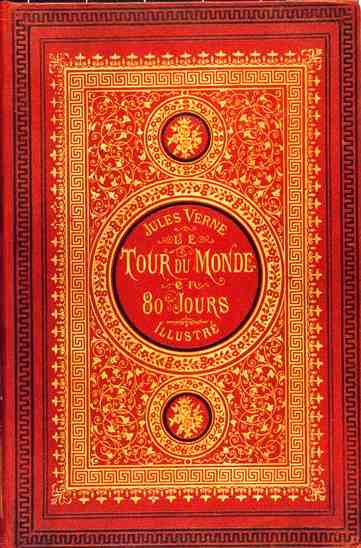
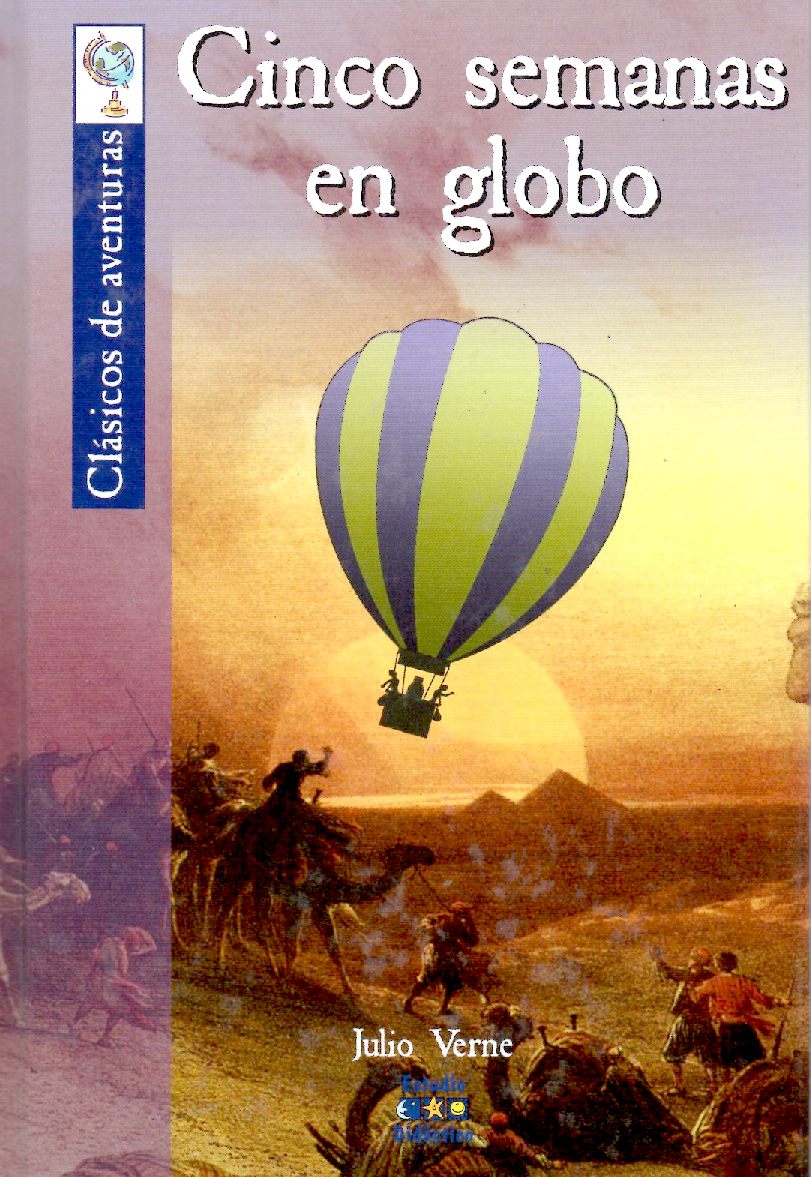
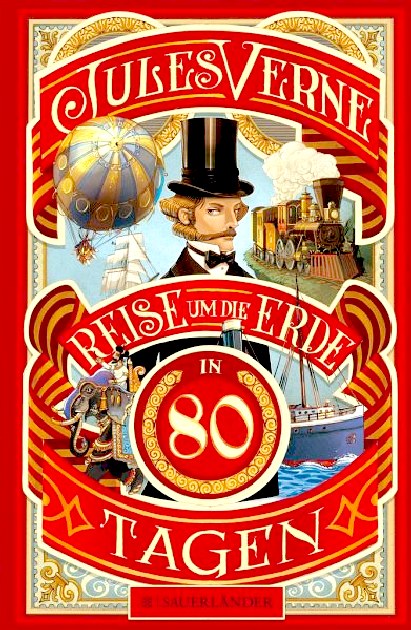
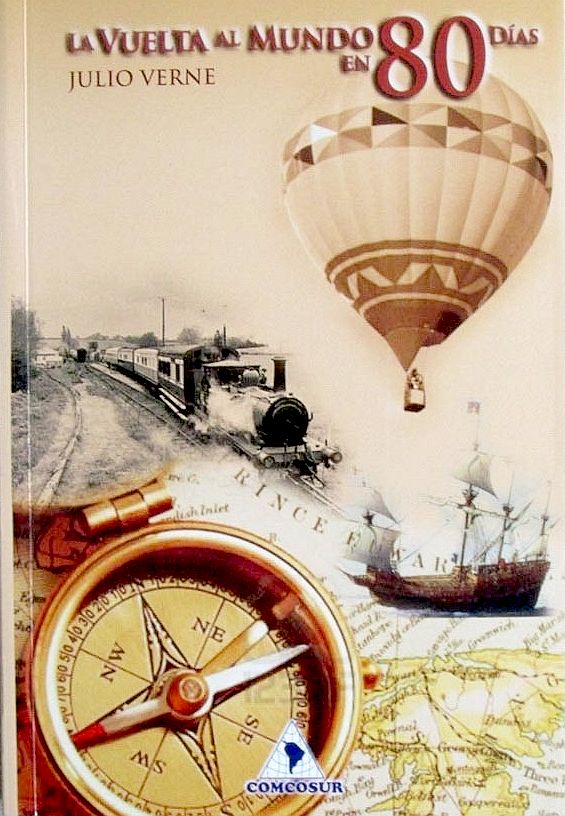
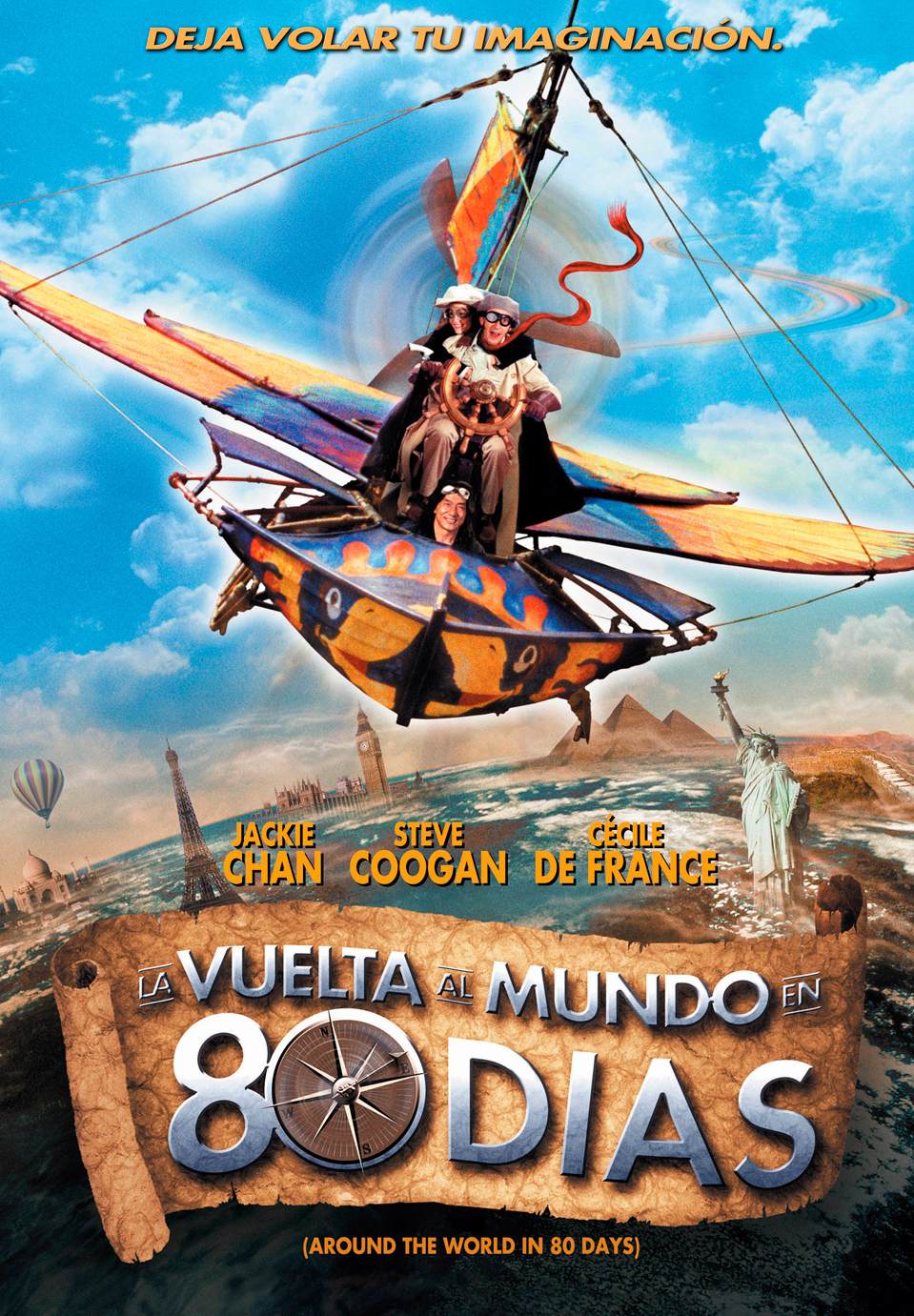
Many
of his stories today seem a little tame, as technology has caught up
with the imagination of the extraordinary French author, and Hollywood
has discovered Computer Generated Images (CGI) allowing super heroes to
grace our screens as never before. Computers are one thing that Verne
did not imagine or seek to portray.
Beginning in late 1872, the serialized version of Verne's famed Around the World in Eighty Days (Le Tour du monde en quatre-vingts jours) first appeared in print. The story of Phileas Fogg and Jean Passepartout takes readers on an adventurous global tour at a time when travel was becoming easier and alluring. In the century plus since its original debut, the work has been adapted for the theater, radio, television and film, including the classic 1956 version starring David
Niven. The TV series starring Pierce Brosnan released in 1989, runs for around 6 hours on
2 DVDs. A BBC
TV travel documentary starring Michael Palin, was also screened in
1989. A second TV series starring David Tennant was produced by the
BBC for 2021.
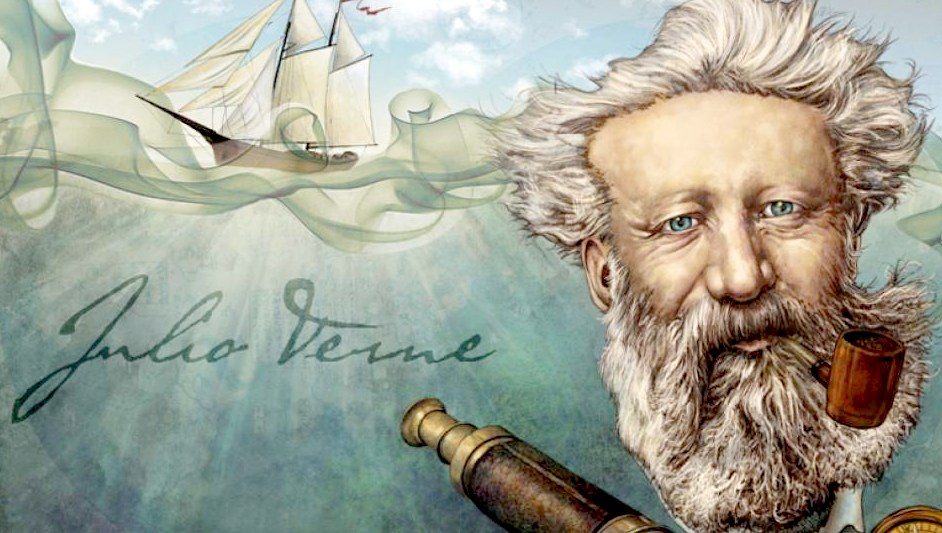
Jules
Verne is known as the Father of Science Fiction
Where
Jules Verne's suggested that it might be possible to travel Around The
World In 80 Days, we would like to extend that ethos to include
traveling in a Zero
Emission yacht (ZEWT or ZEV) driven by electric
hydro-jets? With the advent of solar power and liquid
hydrogen, it is a distinct possibility - on a scale of the wager
that the legendary Philleas Fogg entered into at the Reform Club in
1872.
|







